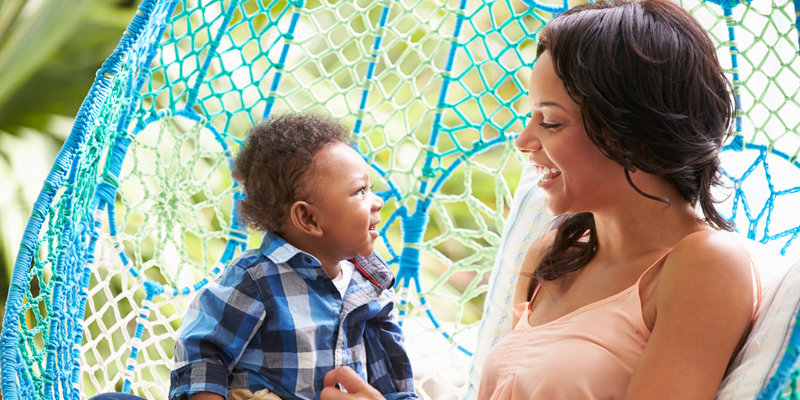
Toddler Talk: Your Baby’s First Conversations
Your baby will show both a growing vocabulary and ability to comprehend books and stories during the 12- to 18-month stage. While you will still find her learning new words and phrases by listening to and imitating familiar people around her, she will now start using single words and short phrases to express herself as well.1 This is the beginning of her ability to have two-way conversations.
She will learn many simple words and phrases just from hearing you recite rhymes, sing songs, and read favorite books to her repeatedly. Your baby will also show more interest in reading and story time; she’ll be able to listen quietly to a story for longer periods of time and will ask for her favorite books to be read again and again.
Towards the end of this phase, your baby may even be able to answer simple questions about the story. For instance, when you ask her “Where’s the dog?” she could respond by naming the dog and pointing to its picture in the book. Over time, you might hear her repeat phrases or words from her favorite stories.
Your baby will soon start to identify body parts, simple objects in pictures, and familiar people in photos.2 Use every opportunity to give your baby real world examples of the words she is learning. If there is a dog in her storybook, point out a dog you see at the park together or show her a photo of a dog in a “First Words” book. The more real world examples your late infant sees, the more she will understand that pictures and letters carry meaning, that objects have similarities and differences, and how various objects fit into everyday life.
(SPECIAL OFFER: Sign up for Playful Bee’s Bee Well developmental learning program to give your baby the best start in life. The first 10,000 children enroll for FREE! Sign up today.)
Play Tips:
Do you want to know how you can support your baby’s development of Conversations, Reading Books and Stories, and Vocabulary Knowledge skills at this age? It’s easy! Read on for some simple tips to incorporate into your daily play time together.
- Read books and sing songs with repetitive words. Describe objects and actions you observe together during reading time.3 Ask your baby simple questions about the story. If she asks, repeat the story or song. Also, don’t be afraid to connect actions in the story to real life situations. If your baby’s favorite book is Little Tiger Takes a Bath, saying “Bath time, Little Tiger!” will help her make real world connections with her books, increasing her understanding of the characters’ emotions and experiences.
- Use consistent language. Repeat the words you use frequently. Encourage your baby to repeat the words and phrases as well, since the more she hears and uses the words, the better she’ll understand them.
- Ask your baby to answer questions and make choices. Even if new words are unfamiliar to your baby, by holding up two different colored shirts and asking her to pick either the red or the navy shirt, you are asking her to focus on the word that relates to each choice. Whichever shirt she selects, restate her choice (e.g. “Okay, you want the navy shirt today!”). This will help that new word stick in her memory.
Developmental Milestones:
Has your baby achieved the following Conversations, Reading Books and Stories, and Vocabulary Knowledge developmental milestones yet? If yes, check off all the skill(s) she has already mastered to date using Playful Bee’s developmental milestones tracker. It’s absolutely FREE and easy to use, just click HERE!
- Converses with simple 1-word question and answers.
- Looks at objects and points to pictures in books when specifically named.
- Says 1-3 additional simple words, other than “Mama” and “Dada.”
- Use single words appropriately (e.g. “yes,” “no,” “stop,” and “mine”).
(SPECIAL OFFER: Sign up for Playful Bee’s Bee Well developmental learning program to give your baby the best start in life. The first 10,000 children enroll for FREE! Sign up today.)
Sources:
1Illinois State Board of Education. For Children Birth to Age Three: Illinois Early Learning Guidelines.
2New Jersey Council for Young Children (2013). New Jersey Birth to Three Early Learning Standards.
3Crosser, Sandra. Enhancing the Language Development of Young Children. Early Childhood News. Retrieved December 17, 2013, from http://www.earlychildhoodnews.com/earlychildhood/article_view.aspx?ArticleID=119.
Playful Bee
Latest posts by Playful Bee (see all)
- Have a Super Fortune Cookie Friday! - February 9, 2018
- All Kinds of Shapes: Your Child Is Learning Simple Shapes, and Drawing Them Too! - November 13, 2017
- Fishing for Sneakers: Create your own Hand-Eye Coordination Fun - November 11, 2017

+ There are no comments
Add yours